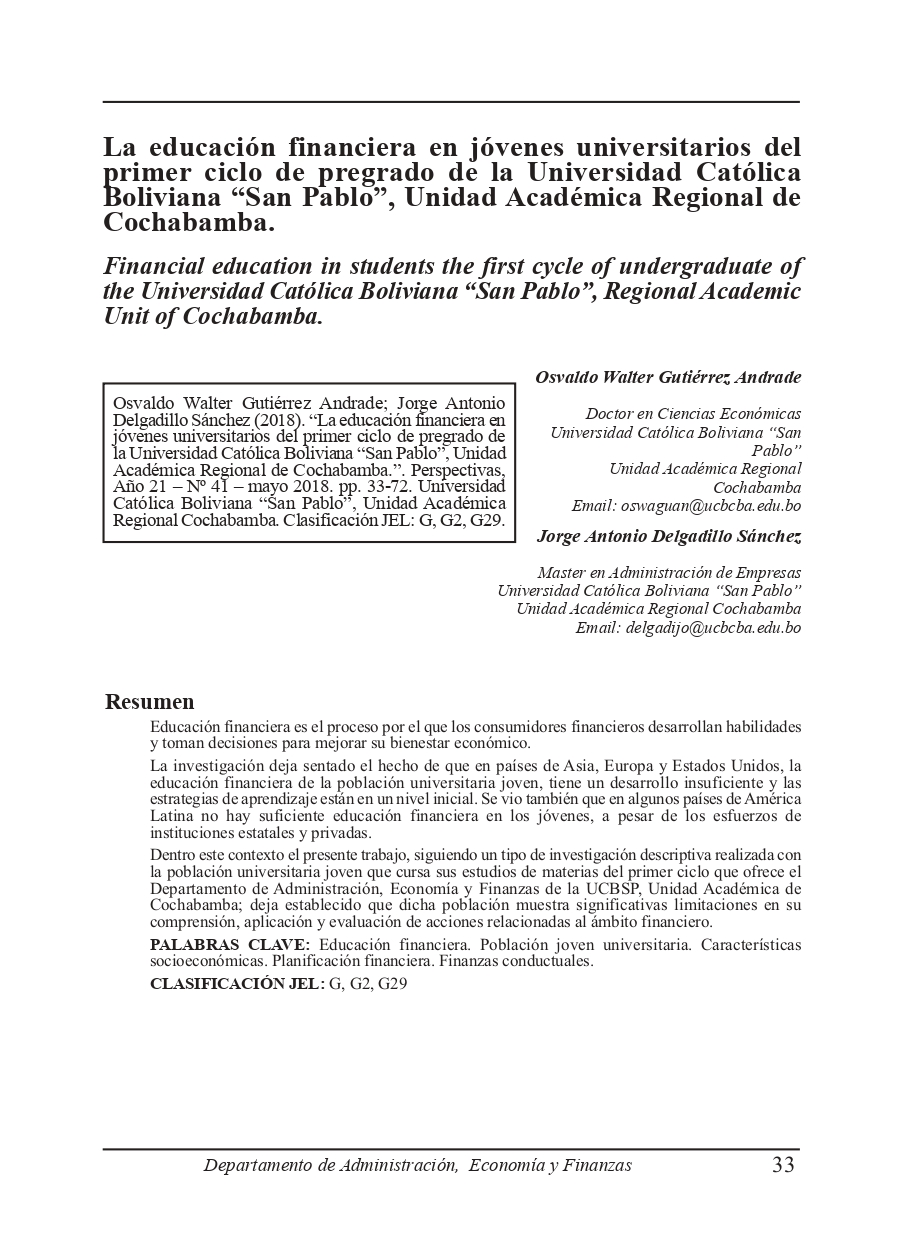Financial education in students the first cycle of undergraduate of the Universidad Católica Boliviana “San Pablo”, Regional Academic Unit of Cochabamba.
DOI:
https://doi.org/10.35319/ky02hr69Keywords:
Financial education, Young University population, Socio-economic characteristics, Financial planning, Behavioural financeAbstract
Financial education is the process by which financial consumers develop skills and make decisions to improve their economic well-being.
Research lets assume the fact that in countries of Asia, Europe and the United States, the financial education of the young university population, has an insufficient development and learning strategies are at an initial level. It was also in some countries of Latin America there is no sufficient financial literacy in young people, despite the efforts of State and private institutions.
Within this context the present work, according to a type of descriptive investigation carried out with the young university population that studies of materials of the first cycle offered by the Department of management, economics and Finance of the UCBSP, Cochabamba academic unit; leave established that this population shows significant limitations in its understanding, implementation and evaluation of actions related to the financial sector.
Downloads
References
Aguilar Jumbo, Ximena Paola & Ortiz Veintimilla, Byron Miguel. (2016). Diseño de un programa de educación y cultura financiera. Loja, Ecuador: s.n.
Amezcua, J., Arroyo, M. & Espinoza, L. (2014). Contexto de la educación financiera en México. México: Ciencia Administrativa.
Asociación de Bancos Privados del Ecuador. (2011). Importancia de la educación financiera.
Bansefi. (2012). ¿Qué es la educación y cultura financiera?
CAF – Banco de Desarrollo de América Latina. (2011). Servicios financieros para el desarrollo: promoviendo el acceso en América Latina. CAF Reporte de Economía y Desarrollo.
CAF – Banco de Desarrollo de América Latina. (2014). La educación financiera en América Latina y el Caribe. Situación actual y perspectivas. No. 12. Disponible en: http://scioteca.caf.com/handle/123456789/379 (consulta: 2015).
Cámara de Bancos de Costa Rica. (2016). Educación financiera para jóvenes.
Children International. (2016). Acceso a educación financiera sigue limitado a nivel mundial.
Cull, R. & Whitton, D. (2011). University students financial literacy levels: Obstacles and aids. The Economic and Labour Relations Review.
David, Fred. (2008). Conceptos de administración estratégica (11ª ed.). México: Pearson Educación.
ENEF. (2011). Investigaciones demuestran que la educación financiera hace una diferencia en la vida de los jóvenes.
García, N., Grifoni, A., López, J.C. & Mejía, D. (2013). Financial education in Latin America and the Caribbean: Rationale, overview and way forward. OECD Working Papers on Finance, Insurance and Private Pensions, No. 33, OECD Publishing.
Gómez Soto, Fernando. (2009). Educación financiera: Retos y lecciones a partir de experiencias representativas en el mundo.
Honohan, Patrick. (2007). Cross-country variation in household access to financial services. The World Bank, Trinity College Dublin and CEPR. Correo: phonohan@worldbank.org.
Lazangorta, Joan. (2011). Los dos mundos de la educación financiera. México: El Economista.
Levine, Ross. (2007). Finance, inequality and the poor. Brown University, NBER & The World Bank.
López Vera, Juan. (2016). La (des)educación financiera en jóvenes universitarios ecuatorianos: Una aproximación teórica. Ecuador: s.n.
Mejía, D. (2012). Tendencias de la educación financiera en América Latina.
Muccio, Guido Andrés. (2014). La educación financiera en la agenda internacional poscrisis financiera 2008. Buenos Aires: FLACSO, Universidad de San Andrés y Universidad de Barcelona.
OECD – Organización para la Cooperación y el Desarrollo Económico. (2005). OECD Financial Education Project.
OECD. (2008). La educación financiera como pilar para el desarrollo financiero de los países.
Orozco, Raúl. (2008). Canales alternativos de acceso a servicios financieros. CEMLA.
Pérez, E. R. (2010). Educación financiera en México. Disponible en: http://ford.ciesas.edu.mx/downloads/2do_1_04.pdf (consulta: 9 de febrero de 2016).
Plan de Educación Financiera 2008-2012. (2012). Disponible en: http://www.cnmv.es/DocPortal/Publicaciones/PlanEducacion/PlanEducacion.pdf (consulta: 7 de noviembre de 2015).
Rankia Comunidad Financiera. (2011). Iniciativas para el impulso de la educación financiera en el mundo. Disponible en: http://www.rankia.com/blog/culturafinanciera/867523-iniciativas-para-impulso-educacion-financiera-mundo (consulta: 11 de diciembre de 2015).
Red Financiera BAC-CREDOMATIC. (2008). Libro maestro de educación financiera: Un sistema para vivir mejor (1ª ed.). San José, Costa Rica: Red Financiera BAC-CREDOMATIC.
Rodríguez Martínez, Giovani. (2013). El conocimiento sobre planificación y manejo de las finanzas personales en los estudiantes universitarios. Puerto Rico.
Rica, Cámara de Bancos de Costa. (2011). Educación financiera para todos.
Ruiz Pérez, Eliseo. (2010). Educación financiera en México. Disponible en: http://ford.ciesas.edu.mx/downloads/2do_1_04.pdf (consulta: 17 de enero de 2016).
Sewell, Martin. (2008). Behavioural finance. Londres: Department of Computer Science, University College London.
Shiller, R. & Thaler, R. (2006). Tools for financial innovation: Neoclassical versus behavioral finance. The Financial Review, 41(1), 1-8.
Thaler, R. H. (1999). The end of behavioral finance. Financial Analysts Journal, 56(6), 12–17.
Vitt, L. A., Anderson, C. et al. (2000). Personal finance and the rush to competence: Personal financial literacy in the U.S. Washington D.C.: Fannie Mae Foundation.
Zapata-Aguilar, Apolinar et al. (2016). Educación financiera entre jóvenes universitarios: Una visión general. Revista Administración y Finanzas, Vol. 3(9). Bolivia: ECORFAN.

Downloads
Published
Issue
Section
License
Copyright (c) 2018 Revista Perspectivas

This work is licensed under a Creative Commons Attribution-NonCommercial-ShareAlike 4.0 International License.
La Revista Perspectivas de la Universidad Católica Boliviana, es una revista de acceso abierto, por lo tanto, es de libre acceso en su integridad. Está permitida su lectura, búsqueda, descarga, distribución y reutilización legal en cualquier tipo de soporte únicamente para fines no comerciales, siempre y cuando la obra sea debidamente citada.




